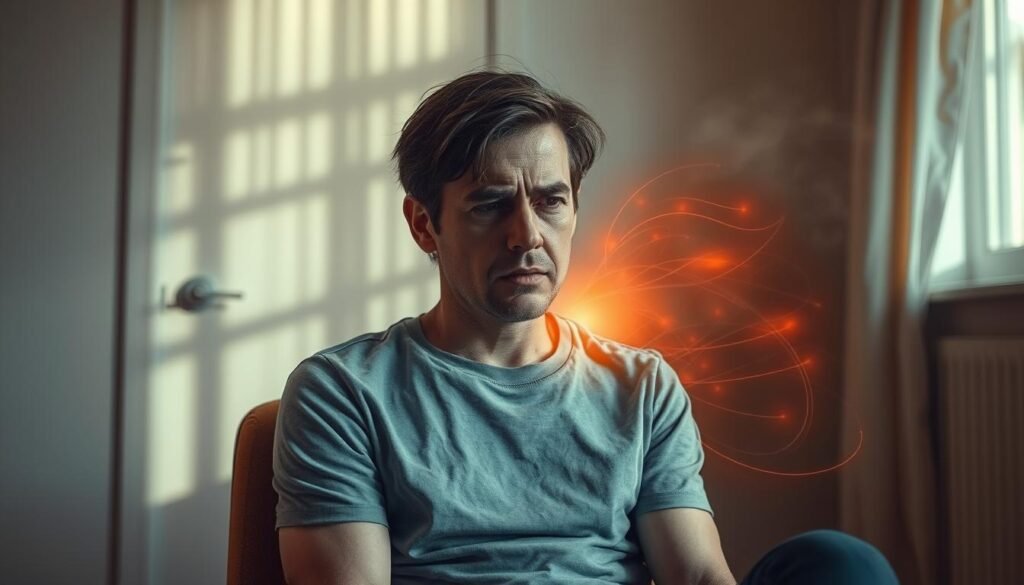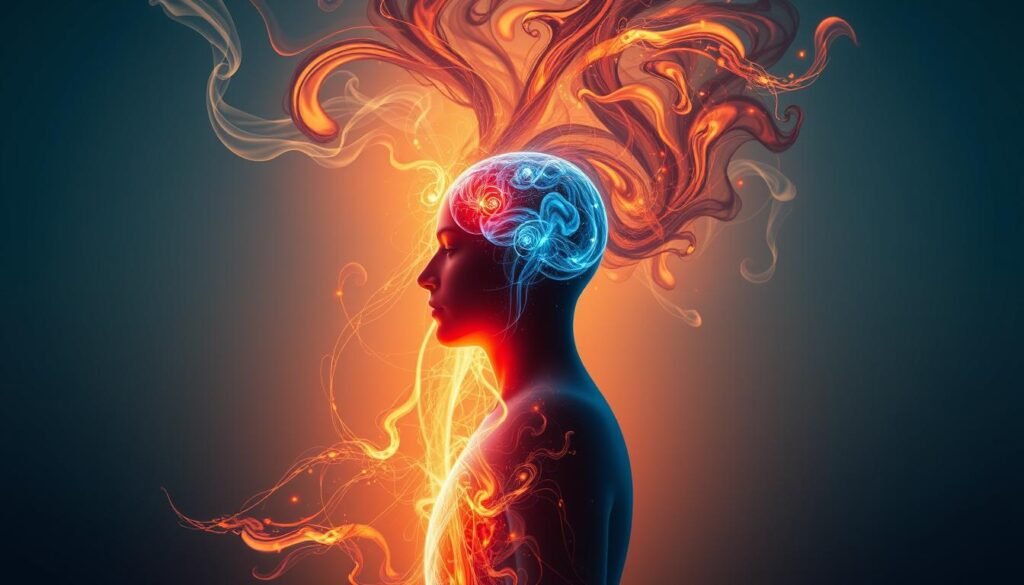About 75% of women going through menopause have hot flashes. These are common but also tied to how we feel emotionally. A study from 2016 found a clear link between anxiety and hot flashes. People with anxiety, especially when stressed or having panic attacks, tend to get hot flashes more.
This discussion focuses on the anxiety and hot flashes connection. It looks into whether mental health can lead to hot flashes during menopause’s changes. For more on this important topic, please see how can anxiety cause hot flashes.
Key Takeaways
- More than 75% of menopausal women experience hot flashes, and anxiety can heighten this symptom.
- Somatic anxiety symptoms significantly increase the likelihood of experiencing hot flashes.
- Managing stress can play a crucial role in reducing hot flash frequency.
- Cognitive behavioral therapy (CBT) is beneficial in addressing anxiety-induced symptoms.
- Understanding the link between anxiety and hot flashes is essential for effective management.
Understanding Hot Flashes
Hot flashes are common during big hormonal changes, like menopause. They feel like sudden intense warmth, often with sweating and flushing. These episodes can happen without warning. They differ a lot in how often and how long they last.
Definition of Hot Flashes
Hot flashes are a quick feeling of heat, mostly in the upper body. It’s mainly due to hormonal shifts, like less estrogen during menopause. People often feel sudden, intense warmth. This can disrupt daily life.
Common Symptoms
Hot flashes affect both body and mind. Common symptoms include:
- Intense heat sensations
- Night sweats
- Heart palpitations
- Dizziness or lightheadedness
These symptoms vary in severity. They differ from one person to another. They can last many years, even up to 11 years.
Causes of Hot Flashes
Menopause is a key reason for hot flashes because of dropping estrogen levels. But lifestyle and health issues also play a part. Stress and anxiety can make it worse. They activate stress responses, increasing body heat.
| Factor | Impact on Hot Flashes |
|---|---|
| Hormonal Changes | Decrease in estrogen levels |
| Lifestyle Factors | Caffeine, alcohol, and smoking |
| Stress and Anxiety | Increased sympathetic nervous system activity |
| Medical Conditions | Hyperthyroidism, infections |
Understanding why hot flashes happen can help find ways to handle them better. Knowing triggers can improve management strategies.
What is Anxiety?
Anxiety is a major mental health issue for many people. It includes disorders that cause ongoing worry and fear. There are different types like generalized anxiety disorder, panic disorder, and social anxiety. Each has its own symptoms and challenges.
Definition and Types of Anxiety Disorders
Anxiety disorders happen when worry is too much and messes with daily life. Generalized anxiety disorder means always being anxious about many things. Panic disorder brings sudden, intense fear episodes known as panic attacks. Each variety adds to how complex anxiety’s effect on the body is.
Physical Symptoms of Anxiety
The physical signs of anxiety can seem like other health problems. People might have a fast heartbeat, sweat a lot, have tense muscles, and even breathe too fast in serious cases. These signs can make stress and worry worse. They also start a cycle where anxiety makes physical discomfort grow, making things harder for the person.
How Anxiety Affects the Body
When someone feels anxious, their body’s stress response kicks in. It raises heart rate and breathing, causing a “fight or flight” reaction. This can feel like hot flashes, mixing up the feeling with menopause symptoms. The link between anxiety and hot flashes shows how anxiety can harm physical health.
To learn more about handling anxiety and its effects, check out different treatment strategies. Using stress management methods can help lessen symptoms and boost well-being. For more tips, visit this website.
The Link Between Anxiety and Menopause
Understanding how anxiety and menopause are connected is key to women’s health. Menopause is a big change that comes with symptoms affecting emotions and physical health.
Overview of Menopause and Its Symptoms
Menopause ends a woman’s ability to reproduce and brings various symptoms. These include hot flashes and shifts in mood. The stage before menopause, called perimenopause, can last about 10 years. During this time, women may deal with symptoms like night sweats. This stage is a big change emotionally as well as physically.
Menopausal Changes and Anxiety
Hormonal changes during menopause don’t just cause physical symptoms. They also play a big role in anxiety disorders. Studies show that these changes greatly affect emotion control. This can lead to more anxiety for women. Anxiety then makes menopausal symptoms worse, causing more distress.
Research Findings on Anxiety in Menopause
Many studies have shown a strong link between anxiety and menopause. They point out that lower estrogen levels can make anxiety worse. Research also says that over half of the women aged 45 to 65 feel mood changes during this time. Using hormone replacement therapy (HRT) may help with anxiety and other menopause symptoms, making life better.
| Study Focus | Findings |
|---|---|
| Prevalence of Anxiety | Over 50% of women report anxiety during menopause transitions. |
| Role of Estrogen | Falling estrogen levels are linked to changes in anxiety levels. |
| Treatment Options | HRT, CBT, and lifestyle adjustments effectively mitigate anxiety symptoms. |
| Duration of Perimenopause | Typically lasts around 10 years, affecting emotional health. |
| Common Symptoms | Includes hot flashes, sleep disturbances, and mood swings. |
Can Anxiety Cause Hot Flashes?
Many people, especially women in menopause, worry about anxiety leading to hot flashes. It helps to understand how anxiety can cause these symptoms. This shows how closely they’re linked.
Mechanisms Behind Anxiety-Induced Hot Flashes
Stress and anxiety kickstart the sympathetic nervous system. This releases stress hormones and raises body temperature. It results in symptoms like hot flashes.
Intense anxiety or panic attacks can cause these symptoms. For example, hot and cold flashes might happen at night. This disrupts sleep and affects overall health.
Studies Supporting the Connection
A 2016 study found a link between anxiety and frequent hot flashes. It shows how anxiety and hot flashes connect, mostly in menopausal women. This is due to hormonal changes they go through.
Somatic Symptoms of Anxiety and Hot Flashes
Anxiety causes symptoms like sweating and flushing. These are similar to menopausal hot flashes. It makes diagnosis and treatment harder.
Women facing these issues should try relaxation techniques. They should also get professional advice. Using support groups and forums is helpful too.

Anxiety Triggers of Hot Flashes
The link between anxiety and hot flashes is strong. Anxiety triggers worsen hot flashes, especially in menopausal women. Knowing this helps those dealing with these tough symptoms.
Common Anxiety Triggers
Money worries, job stress, and health issues add to anxiety. This can make stress and hot flashes worse in people. Recognizing these triggers helps in managing them better.
How Stress Heightens Hot Flash Potential
Stress triggers the body’s fight-or-flight mode. This increases cortisol, making hot flashes more intense. Stress and hot flashes thus feed into each other, causing more issues.
Panic Attacks and Hot Flash Correlation
Panic attacks bring intense fear, fast heartbeat, and changes in temperature. These attacks can make hot flashes worse. The fear of more attacks increases anxiety, which then amplifies both symptoms.
Emotional Stress and Hot Flashes
The link between emotional stress and hot flashes can significantly affect a woman’s menopause experience. Emotional stress doesn’t just cause discomfort. It also impacts physical health. Knowing more about emotional stress and hot flashes can help manage these symptoms better.
Impact of Emotional Stress on Physical Health
Emotional stress over time can lower immune defenses and upset hormonal balance. This imbalance can cause hot flashes, a common menopause symptom. Emotional stress and hot flashes worsen each other, making physical health issues bigger. Stress-induced sweat, different from regular sweat, is also more likely during these moments.
Emotional Responses to Hot Flash Episodes
When hot flashes happen, people often feel embarrassed or anxious. These feelings can make stress worse, which might increase the intensity of hot flashes. Studies show women with anxiety disorders may face more hot flashes as menopause nears. This cycle of stress and hot flashes can lower life quality. Cognitive behavioral therapy has been effective in helping women deal with these issues.
| Element | Description |
|---|---|
| Emotional Stress | Involves feelings of anxiety, overwhelm, and tension that can negatively impact health. |
| Hot Flashes | A common menopausal symptom characterized by sudden feelings of warmth, often in the face and neck. |
| Physical Health Impact | Can weaken immunity and disrupt hormonal balance, contributing to increased hot flashes. |
| Emotional Responses | Feelings of embarrassment or anxiety experienced during hot flash episodes. |
| Therapeutic Approaches | Cognitive Behavioral Therapy and lifestyle changes can help manage symptoms. |
Managing Anxiety-Related Hot Flashes
To manage anxiety-related hot flashes, it’s vital to use effective coping strategies. These techniques can bring both quick relief and long-term help, making it easier to handle the symptoms. Knowing about these methods is very crucial for anyone dealing with anxiety and hot flashes.
Coping Techniques for Quick Relief
For quick relief from anxiety-caused hot flashes, try these:
- Deep Breathing: Slow, deep breaths can ease your mind and lessen the anxiety that might cause hot flashes.
- Staying Hydrated: Drinking lots of water helps your body stay cool and can reduce hot flash discomfort.
- Finding a Cool Environment: Going somewhere cooler or using fans can quickly comfort you during a hot flash episode.
Long-Term Strategies for Managing Anxiety
To manage anxiety and hot flashes over the long run, consider these lifestyle changes:
- Regular Exercise: Staying active can lower anxiety and improve your mood, which reduces hot flashes.
- Mindfulness Practices: Activities like meditation or yoga can help you relax and feel emotionally better.
- Establishing a Support Network: Having the support of friends, family, or groups can lessen anxiety-related symptoms.
Professional Help: Therapy and Medication Options
If anxiety and hot flashes persist, getting professional help is key. Therapies and medications for anxiety can greatly help:
- Cognitive Behavioral Therapy (CBT): CBT effectively tackles anxiety by changing negative thinking patterns.
- Medications: Certain medicines, like SSRIs and beta-blockers, work well against anxiety and hot flashes.
Using a mix of quick-fix techniques, long-term changes, and seeking professional advice can make dealing with anxiety-related hot flashes much more manageable.
Psychological Link to Hot Flashes
The link between our minds and bodies is key to our health. It shows how stress and mental health can change our physical health. Anxiety, for example, can make hot flashes stronger for many people.
The link between anxiety and hot flashes is clear, especially during menopause. This is when women go through big hormonal changes.
Understanding the Mind-Body Connection
Our minds can cause physical symptoms to appear. Women with anxiety might feel more sensitive to changes in temperature. Stress triggers a response in our bodies that can mess with how we control temperature.
When we’re anxious, the part of our brain that controls temperature might get confused. This can make hot flashes more common during menopause.
How Anxiety Influences Perception of Hot Flashes
Anxiety can make physical feelings, like hot flashes, seem worse. Research shows women with anxiety are much more likely to get hot flashes. Those with physical anxiety symptoms are three times more likely to report strong hot flashes.
This sensitivity can make dealing with hot flashes harder. It creates a cycle of anxiety and discomfort.

| Factor | Impact on Hot Flashes |
|---|---|
| Anxiety Disorders | Increases likelihood of experiencing hot flashes |
| Hormonal Changes | Triggers disruptive temperature regulation |
| Stress Levels | Heightens perception of hot flash severity |
| Somatic Symptoms | Elevates risk of reporting hot flashes |
| Treatment Methods | Cognitive behavioral therapy may assist in managing symptoms |
When to Seek Medical Advice
Knowing when to get medical help for hot flashes is key. Hot flashes are common, but they can signal bigger health issues. It’s important to know when to see a doctor. This helps you take action for your health.
Signs That Require Professional Consultation
If hot flashes happen a lot or come with irregular heartbeats, big weight loss, or deep tiredness, see a doctor. These could mean serious health problems needing quick checks. Also, if hot flashes mess with your daily life or happiness, getting medical advice is key.
Possible Underlying Medical Conditions
Some health issues that look like hot flashes need careful checks. For example, hyperthyroidism and infections could show up as hot flashes. Getting the right medical advice makes sure you’re treated correctly. This prevents more health trouble.
Importance of Holistic Evaluation
Looking at your whole health is crucial for treating hot flashes. This means talking about your mental health too because anxiety might make hot flashes worse. This full view helps doctors make a plan that’s right for you.
Hot Flashes Anxiety Treatment
Looking for ways to handle hot flashes and anxiety can make life better. There are many strategies out there, from medicine to changes in how you live. We’ll look at both medical and non-medical ways to deal with these issues.
Medications for Hot Flashes and Anxiety
Many medications for hot flashes and anxiety work well. Hormone replacement therapy (HRT) is one choice. It offers estrogen and progesterone for people with a uterus. And estrogen-only for those without. Other helpful drugs include venlafaxine, desvenlafaxine, and more. They can ease hot flashes.
Non-Medical Approaches to Treatment
For non-medical treatments, lifestyle changes can offer relief. Adding activities like yoga and learning to manage stress helps a lot. Also, dressing in layers helps with changing body temperatures. Keeping your home cool is another tip.
- Dressing in layers to accommodate temperature fluctuations
- Establishing a cool home environment
- Drinking cold beverages
- Maintaining a healthy weight
- Avoiding smoking and alcohol
Eating foods with plant estrogens can also aid. Foods like soybeans, chickpeas, and flaxseed are good sources. While stopping hot flashes completely may not be possible, steering clear of known triggers can reduce their impact.

| Approach | Description | Examples |
|---|---|---|
| Medications | Pharmaceutical options for alleviating hot flashes and anxiety symptoms. | Hormone therapy, venlafaxine, fluoxetine |
| Non-Medical Treatments | Lifestyle changes and alternative methods to manage symptoms. | Yoga, stress management, dietary changes |
Combining these treatments can really help with hot flashes and anxiety. Talking to healthcare professionals is crucial. They can help customize a plan that’s right for you and your health.
Conclusion
The link between anxiety and hot flashes is a big deal for many, especially during menopause. Studies show that 72% of people in research felt moderate to severe hot flashes. Those dealing with somatic anxiety were three times more likely to have them. It’s key to know your symptoms well. This helps in spotting triggers and handling hot flashes better.
There are ways to find relief for these issues both now and in the long run. Short-term fixes include cooling down methods and changing what you eat. For long-term help, therapy or medication might be needed for anxiety-induced hot flashes. It’s smart to get advice from a healthcare pro. This way, you get a plan that fits both your anxiety and menopause signs.
Understanding how anxiety and hot flashes are linked can really improve your life. By getting a handle on hot flashes and the anxiety behind them, you can move through these changes more smoothly. This approach brings more comfort and ease into your life.